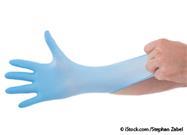No More Powder With Your Latex Gloves

The use of powdered medical gloves is on the decline, but they may soon become a thing of the past.
The U.S. Food and Drug Administration (FDA) released a proposal to ban most powdered gloves in the U.S., stating they “pose an unreasonable and substantial risk of illness or injury to health care providers, patients and other individuals who are exposed to them.”1
The issue cannot be corrected through new or updated labeling, hence the suggested ban. Powder is sometimes added to medical gloves because it makes them easier to take on and off — hardly a justifiable reason to put even one person at risk.
Powdered Gloves May Cause Allergic Reactions, Inflammation and More
A number of health risks have been linked to powdered medical gloves. When powder is added to natural rubber latex gloves, in particular, it may carry proteins that can cause respiratory allergic reactions when aerosolized and inhaled.2
Powdered synthetic gloves do not pose this risk of allergic reaction, but they (and the use of glove powder with any type of glove) are associated with other risks including:
- Severe airway inflammation
- Wound inflammation
- Post-surgical adhesions (fibrous scar tissue that forms between internal organs and tissues)
The problems occur when the powder from the gloves gets into the air, wounds or surgical openings. Inhaling glove powder has been linked to an increased risk of asthma and an increased risk of developing allergies such as latex allergy.
In people with latex allergy, inhaling the dust, which may contain allergenic proteins, may cause an allergic reaction. In addition, when the dust gets into wounds it can delay healing and cause other adverse reactions.
Powdered Glove Ban to Have Little Economic or Practical Impact
Medical gloves are an integral part of modern-day medicine, so as part of its analysis the FDA wanted to be sure the ban would not lead to a glove shortage. This is unlikely, since there are already many non-powdered glove options available.
An economic analysis also showed that a powdered glove ban would have no significant economic impact. The proposed ban would apply to powdered surgeon’s gloves, powdered patient examination gloves and absorbable powder for lubricating a surgeon’s glove.
If the proposed ban passes, which appears likely, it would be only the second time the FDA has banned a medical device (the other was prosthetic hair fibers, which were banned in 1983).3
FDA Has Known About Risks of Powdered Gloves for Years
In 2008 and 2009, the FDA received two citizen petitions requesting the FDA ban powdered surgeon’s gloves and patient examination gloves.4
At the time, they noted that the petitions raised legitimate concerns about the use of powdered gloves, but said they still needed to consider the risks in light of any benefits, such as if the powdered gloves offered unique benefits in performing certain procedures.
In 2011, the FDA issued a public notice and requests for comment regarding the issue, and noted that in the meatime “the risks that have been identified support a recommended labeling statement advising health care providers and consumers of the risks presented by glove powder.”5
The FDA used comments received regarding this notice as part of their analysis that led to their 2016 ban proposal.
A review of the scientific literature suggests this ban is long overdue — especially since powder-free medical gloves that can be put on easily have been available since the 1980s.6 Why is the FDA just now following suit?
Powdered Gloves Harm Patients and Workers Via Five Mechanisms
In 2001, a review published in the Journal of Long Term Effects of Medical Implants revealed that adding cornstarch dusting powder to medical gloves presents a health hazard to patients and health care workers via five different mechanisms:7
- Documented detrimental effects on wound closure techniques
- Potentiates wound infection
- Induces peritoneal adhesion formation
- Induces granulomatous peritonitis
- Serve as carriers of latex allergen that may cause a life-threatening allergic reaction
These hazards were so well documented that both the U.K. and Germany banned cornstarch powder on medical gloves prior to the year 2000. As reported in a 2000 Journal of Emergency Medicine study:8
“Scientific experimental and clinical studies have demonstrated that cornstarch on surgical and examination gloves promotes disease by acting as a reactive foreign body in tissue and serving as a vector for latex allergy.
Consequently, hospitals have selected an innovative glove selection program utilizing only powder-free gloves. Healthcare workers in emergency medical systems are now wearing powder-free, latex-free gloves to care for the growing number of patients sensitized to latex.
A global Internet search has now identified 70 hospitals in the United States and three hospitals in Europe that use only powder-free gloves.”
Even Manufacturers Are Against “Medicine’s Deadly Dust”
In an interview with Infection Control Today (ICT), glove manufacturers including Halyard Health and Molnlycke Health Care agreed with the concerns over powdered gloves and stated that’s why they only produce powder-free gloves. Molnlycke Health Care explained:9
“Medical glove powder has been called ‘Medicine’s Deadly Dust’,” with only one benefit – to facilitate glove donning.
The harmful effects of medical glove powder to patients and healthcare workers have been widely known for decades and were called to the attention of the FDA in the 1990s.
About 20 years ago AAAAI [The American Academy of Allergy, Asthma & Immunology], ACAAI [The American College of Allergy, Asthma and Immunology] and NIOSH [The National Institute for Occupational Safety and Health] recommended using powder-free medical gloves due to the known harmful effects of glove powder.”
Although the FDA published a report in 1997 outline the adverse health effects of powdered gloves, they rejected a 1998 petition to ban the gloves. Molnlycke Health Care explained:10
“As reasons, the FDA cited the following: powder-free gloves were more expensive and would increase hospital costs; the quality of powder-free gloves were often inferior to current powdered gloves and might increase risks; latex allergies were not addressed by the petition.”
Allergies and Asthma Dropped Dramatically When Germany Ditched Powdered Gloves
In 1992, nearly all medical gloves used in Germany were powdered but buy 2002 powder-free gloves dominated the market — and resulted in significant health benefits to residents. Molnlycke Health Care continued in the ICT interview:11
“By 2002, the use of powder-free surgical gloves in Germany had risen to 88 percent … Dr. Henning Allmers, a German allergist/immunologist, reported an 83.6 percent decrease in new skin allergy cases and an 87.8 percent reduction of reported new cases of occupational asthma in Germany by 2002.
… In addition, allergists and immunologists in the U.S. have seen proportion-ate declines of new glove-related allergy patients as the use of powder-free medical gloves has increased in this country. Powder-free gloves provide multiple benefits because the powder elimination process removes the step of adding cornstarch powder used for glove donning.
The manufacturing process also removes the mold-release calcium carbonate powder and reduces extractable chemicals and extractable latex proteins through a number of additional rinsing steps. The resulting powder-free gloves are not only cornstarch powder-free, but also calcium-carbonate powder-free and contain lower levels of common glove allergens and irritants.”
Changes in Glove Market Overcome FDA Objections: Is a Ban Imminent?
In the last 17 years, the quality of powder-free gloves has improved, prices for the gloves have dropped and they’re widely available on the market. As Molnlycke Health Care explained, “So, the three original FDA objections to the 1998 petition have been overcome by changes in the glove market.”12
In 2015, the vast majority of surgical gloves sold in the U.S. were powder-free; only 16 percent were powdered. The powdered glove market is also declining fast at a rate of -6 percent a year while the market for powder-free gloves is increasing by 12 percent.13
It appears an eventual ban on the powdered gloves is imminent in the U.S., but a final decision still has to be made. The FDA’s proposal is now open to public comment until June 20. You can add your own comment here. In the meantime, be sure any health care provider you see is using powder-free gloves — powdered gloves are simply not worth the risk.








